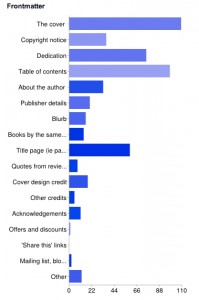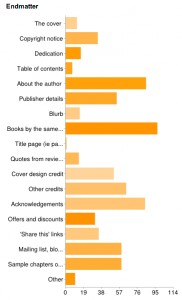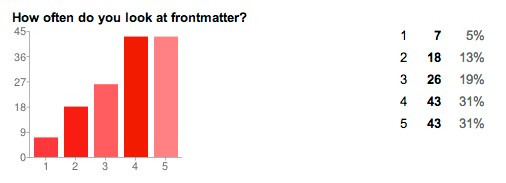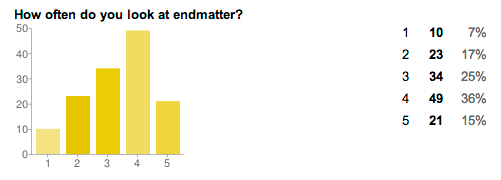A while ago I stumbled on this post from Eric Hellman exploring the question of what sort of front- and endmatter makes sense for ebooks, given that many of the pages that we see in the front of paper books have a purpose related to the printing process. Says Hellman:
A good example is the bastard title (or half title) page. This a page, usually printed with only the book’s title, that precedes the title page in the book. When dinosaurs roamed the earth, the function of the bastard title was to identify and physically protect the paper text block until it was bound. Sort of like the tissue paper they still put in fancy wedding invitations. I daresay that ebooks do not require any such protection. It is utterly without use in an ebook. Begone!
Next, consider the title page. It typically displays the books title, author, and the publisher.
In a print book, the title page is a declaration of bookiness. You don’t have title pages in magazines or newspapers. The title page says “get, ready, here comes a book, so go find a comfy chair.”
But a digital book needs something different. It needs a start page. Think about the start screen of a DVD. (You DO remember those, don’t you?) Now think a bit more generally. Modern ebooks share their underlying technology with websites, so why not convert the title page of a book into a home page for the book, with the sort of utilities you expect on a home page?
That got me to thinking, which then got me to asking questions on Twitter, and finally, to setting up a wee questionnaire. Rather than try to guess what people might want, I thought it was easier to just ask them, and 137 people gave me their opinions. The results were in some ways surprising. But first, the not so surprising bits.
For the front matter, people mainly want to see the cover, dedication and table of contents. Several people on Twitter made the point that the Kindle dumps you in at the first page of text, meaning that you then miss out on seeing the cover, so a link to it in the table of contents to the cover is actually rather useful.
Although people aren’t massively keen on seeing a copyright notice, I think it’s only fair to tell people what they’re getting up front, so I personally think that should be retained. And the title page, which Hellman suggests could be replaced by a ‘start’ page, got a pretty good response despite the fact that it serves no real purpose in an ebook.
Perhaps it’s just that a title page is for many people a key part of the visual language of the book, it’s comforting and expected. That ‘declaration of bookiness’ is still important, so whilst removing it might make logical sense, does it make emotional sense?
For endmatter, people wanted to know about the author, find other books by the same author, see acknowledgements and other credits, get information about the author’s mailings list, blog etc., as well as get sample chapters of other books.
Interestingly, some of the stuff that an author’s ego might be tempted to include scored very badly, such as the blurb and quotes from reviews, and there was little interest in offers and discounts. I’m surprised by the latter, to be honest. Who doesn’t like a bargain? Book readers, apparently.
After some really vehement reactions about ‘share this’ links on Twitter, I asked specifically for people’s reaction to them. What did they think of them? What I got was, well, interesting and, again, a bit surprising.
Yes, some people said that they appreciated ‘share this’ links, and a lot of people said they were non-plussed by them or ignored them, but others were quite vocal in their objections. Here are some of the positive responses:
“I think they’re fine. I like to share things I like with friends.”
“I like the idea of sharing what I’m reading with my friends/followers.”
“Just seems natural to me.”
And some of the, erm, less positive responses:
“I’m trying to read. Leave me alone!”
“Really irritates me. Naked attempt at marketing, very offputting. If a book is good I wont need reminding to word of mouth it.”
“I find them annoying”
“an irritating page to be clicked past – I have no desire to share my reading habits with others”
“Yuk…”
“I don’t getting social points for what I’m reading, but I don’t want to be seen as *seeking* social points for what I’m reading. So screw you, “Share this” links.”
“Don’t use them – I find them intrusive.”
“Get annoyed and ignore it.”
“I think ‘not fucking likely’.”
“HATE, HATE, HATE them. I don’t “share” every minute of my time on FB or twitter, and resent the assumption that I might want to.”
“I find it extremely irritating – I have no desire nor need to ‘share’ everything I buy with everyone I know or might know!”
“I think OH MY GOD AM I ALLOWED A SINGLE THING IN MY LIFE THAT ISN’T CONNECTED TO BLOODY FACEBOOK AND TWITTER?!”
“If I like a book I’m more than capable of typing the title and author name in myself to recommend it to others- and if you use the “share this” button people can always tell when its a prewritten message.”
“Basically, these links are a bad thing, probably the worst thing about ebooks from a reader’s point of view, and I am against them.”
Although many were entirely unbothered by ‘share this’ links, the intensity of emotion amongst those who disliked them was so fierce that I think it’s just not worth risking antagonising readers by including them. If someone’s taken the trouble to read my book, the last thing I want to do is accidentally leave them with a sour taste in their mouth. If they want to share it, then they will, and they’ll do it however they wish, whenever they wish.
Finally, I asked people whether they actually read front- and endmatter, with 1 being ‘never’ and 5 being ‘always’:
I’m actually quite surprised that people mostly do read front- and endmatter, so the question of what to include really is worth carefully considering.
I think I’m starting to get a standard set of front- and endmatter that ticks the right boxes for me and hopefully for my readers too. But the nice thing about ebooks is that they are easy to change and I’m still interested in people’s opinions, so please do leave a comment!
{ Comments on this entry are closed }








